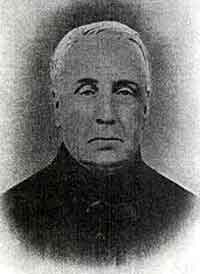|

Anthony Dominic Fahy
(1805-1871)
(Ussher 1951)
|
Fahy
[Fahey], Anthony Dominic (1805-1871),
Dominican priest and missionary, was born on 11 January
1844 in Loughrea, Co. Galway, the eldest son of Patrick Fahy
(d.1810) and Belinda Cloran (d.1843).
At
the age of twenty Fahy joined the order
of Saint Dominic, and received the habit on 4 August 1828.
Immediately after profession he was sent to Rome to study
for the priesthood in Saint Clement's College. Anthony
Fahy was ordained
priest on 19 March 1831 and completed his studies in
1834. He left Rome for St. Joseph's Convent, Somerset,
Ohio (United States), where he stayed up to 1836, and returned to
Ireland and was nominated Prior of Black Abbey
Convent in Kilkenny.
In 1843,
Fr. Fahy was appointed by Archbishop of Dublin Daniel Murray to
the Irish chaplaincy of Buenos Aires. Fahy arrived
in Buenos Aires to replace Fr. O'Gorman. He lived in in
an apartment lent by Thomas Armstrong, which was in the
same building of Botica de Cranwell. In 1847 Fr. Fahy organised his first
fundraising campaign, and collected £441-1s-10d for
the victims of the Irish famine. The following year, during the events leading
to Camila O'Gorman's and Uladislao Gutierrez's execution, Fr. Fahy played a key role.
"The Irish Catholic
Church, dominated by the formidable figure of Fr. Fahy
who for years had been instrumental in the immigration
of his people into Argentina, demanded an exemplary punishment
for the wayward daughter, that was also giving the industrious
and well-regarded community a bad name" (Julianello
2000).
In 1849, perhaps to gain greater support from Juan
Manuel de Rosas, Fr. Fahy wrote a public letter in refutation of allegations published in England against the
governor and
to acknowledge his favour. In 1854 a new parish was created in
Avellaneda. Fr Fahy, whose ministry had been directed at the Irish
working meat-curing plants,
did not change the orientation of his mission.
"This did
not please the incumbent of the new parish, so he complained
to the Bishop that the Irish Chaplain was violating the
canonical regulations, principally by blessing the matrimonial
unions of the 'Irlandeses'"' (Ussher 1951: 153). Fr. Fahy organised
his flock in chaplaincies in Buenos Aires province, and appointed
twelve Irish priests to
these areas. He personally paid for their studies at All
Hallows seminar of Dublin. Sometimes there were conflicts
between these chaplains and Fr. Fahy. Some
of them recommended that patients use the British Hospital
instead of the Irish Hospital.
Fahy has a
reputation of matchmaker. During the five years ending in
1856 Fahy blessed 185 Irish marriages. On 19 May 1864 President Mitre appointed Anthony
D. Fahy honorary canon of the cathedral church of Buenos
Aires. On 12 July 1865 a committee
presided by Michael Carroll presented Fr. Fahy a gift of
$76,500 currency (about £600) "as a general expression
of your countrymen, both in town and camp districts, [...]
an evidence of the esteem of so many of your co-religionists
shared in by several of different persuasions, who voluntarily
desired to be associated in so well merited a
testimonial."
Among the subscribers there were many English, Anglo-Irish,
and "a Protestant Admirer of Fr Fahey" (Murray 1919:
322-327).
Fr. Anthony
Fahy died of a heart attack on 20 February 1871, though
chronicles report that he died a victim of the yellow
fever owing to his attending to the sick. "It has often
been stated and most people have taken it for granted
that he died of yellow fever, […] but the certificate
of death signed by two medical men, states that he died
from heart disease" (Murray 1919: 344). He suffered from
heart problems long time before his death.
Edmundo
Murray
References
-
Ussher, James M., Father Fahy: a Biography of Anthony
Dominic Fahy, O.P., Irish Missionary in Argentina, 1805-1871
(Buenos Aires, 1951).
- Murray, Thomas, The Story of the Irish in Argentina
(New York: P. J. Kenedy & Sons, 1919).
- Julianello, Maria Teresa, The Scarlet Trinity: The Doomed
Struggle of Camila O'Gorman against Family, Church and
State in 19th C Buenos Aires (Cork: Irish Centre for
Migration Studies, 2000).
|


